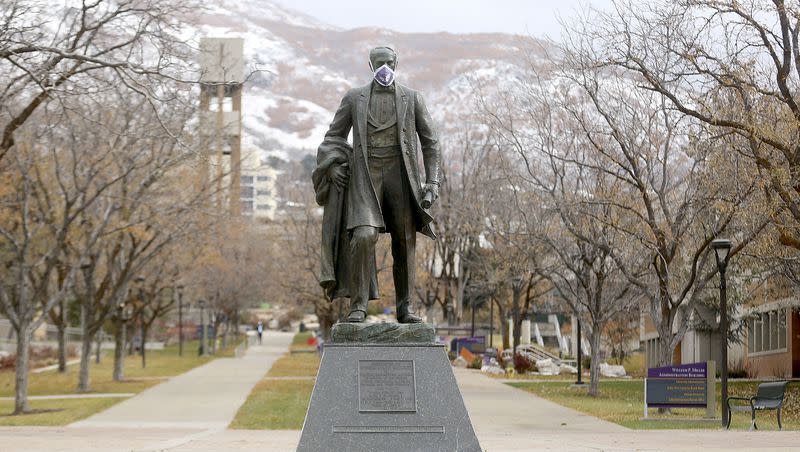Opinion: To save the university, we must go ‘back to the future’

Oct. 7 of last year has taken its place in history as yet another “day that will live in infamy.” The shock of the Hamas slaughter of Israeli innocents — and the baffling response from so many young Americans — continues to reverberate. The tragedy threw a bright spotlight on the shocking moral vacuity rampant on today’s university campus, which for many of us was no surprise.
These events compounded a growing skepticism about the work-readiness of our college graduates, even from the nation’s most elite schools. Several CEOs and a number of major law firms have, for example, expressed reluctance to continue hiring Ivy League graduates. A Harvard graduate, billionaire Ken Griffin, withdrew his support from his alma mater, calling its graduates “whiny snowflakes.”
As skepticism grows, public confidence in higher education has reached all-time lows nationally, with many questioning the value proposition of a college degree. University of Utah president Taylor Randall has rightly noted that Americans’ confidence in higher education has declined steeply to 36%. Fortunately, Deseret News polling shows that a majority of Utahns (52%) still maintain significant faith in higher education, but that does not mean there is no work to be done.
I agree with Randall that we must address this eroding faith in higher education. I believe that it will require a fundamental rethinking of our approach to a university education, starting with core curriculum requirements.
How have university values become so unmoored? I believe it is the abandonment of the foundational principles that once produced generations of grounded, educated citizens. “Woke” dogma has infected academic curriculum, stifling free speech and critical thinking. a fact well summarized by Michael Gibson, “even though there are some 5,300 universities and colleges in the U.S., there is only one point of view on every campus.”
Critical theory and post-modernism have superseded Western thought, art and literature, giving way to the narcissistic nihilism of the modern academy. So-called “neo-Marxism” underlies much of this shift; it is the driving force of the New Left and source of the false binary of “oppressed vs. oppressor” that appears to govern most behavior and belief in today’s academia.
Worse yet, taxpayers are footing the bill for all of this. To repeat an apocryphal Marxist adage, “The capitalists will sell us the rope with which we hang them.” In fact, it’s even worse. By funding today’s universities, we are not selling the rope to those who wish to destroy our republic; we are handing it to them for free, paid for with taxpayer dollars. That begs the question, why would we continue to do so?
Yet as one who holds a Ph.D. and taught for many years at Utah State University, I continue to believe in the value of a university education for many. I do not believe that it is too late to restore higher education to its rightful, essential place in a free society.
That is why I am introducing reforms that will retune our Utah universities to the timeless truths that built our nation. To save the university, we must go “back to the future.”
SB226 proposes that we begin by redirecting general education — the fundamental coursework graduates must complete on the way to their major degree — to once again inspire free thought and solid citizenship. We must return to the intellectual foundations of American and Western civilization to produce the leaders and the informed, conscientious citizens of tomorrow.
Utah lags behind where it should be in foundational higher education. Our initial proposed reforms include the restoration of rhetoric and English composition, Western and American history, classical philosophy and civics, plus neoclassical economics. No matter what specialty a student may choose as a major, they ought to have solid grounding in the fundamental skills, principles and thought upon which America was built.
America is far from perfect and Western thought is not without flaw. But while imperfect, America is still the greatest nation ever established; it is indeed the “last best hope of man on earth.” In composing our establishing documents, the Founders relied upon what came before them — the Bible, Greek philosophy, the Roman republic, the Magna Carta, a thousand years of British Common Law, and the corpus of great Western thought. We would do well to follow their lead.
The woke curriculum currently in vogue will remain available and uncensored. But reinstituting a traditional introductory curriculum, with faculty qualified to teach it, will help reestablish a truly competitive marketplace of ideas at our public universities.
Utah’s public higher education system is obligated to produce leaders that value intellectual rigor, innovation and open inquiry, and who understand the past. Every student should be clear-eyed about America’s triumphs and tragedies so they may better navigate America’s future challenges. Let “elite” colleges and universities double down on cultural division and political zealotry. Utah’s institutions must lead in building a citizenry capable of meeting the needs of our future workforce, our communities and our constitutional republic.
Sen. John Johnson is an entrepreneur and an academic, and represents Utah Senate District 3. He and his wife live in Ogden.

